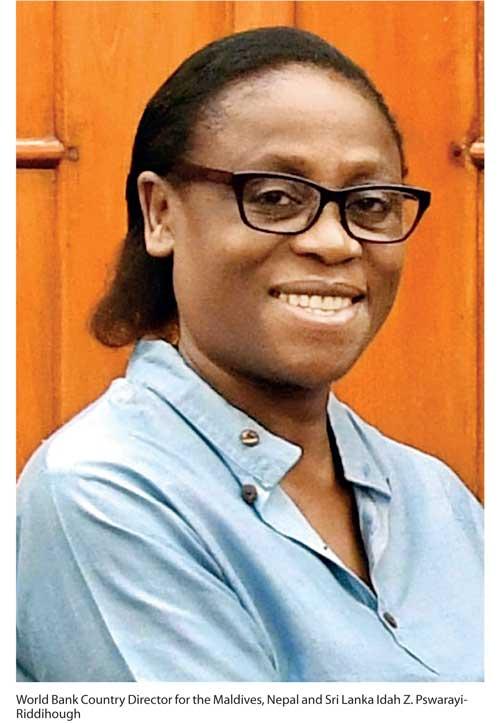29 Jun 2020 - {{hitsCtrl.values.hits}}
Outgoing World Bank Country Director for the Maldives, Nepal and Sri Lanka Idah Z. Pswarayi-Riddihough speaks about the highlights of her four years in Colombo. She also shares her thoughts on the opportunities she sees for Sri Lanka and wishes the people of the country the very best as they contend with the impacts of the global pandemic.
What are the highlights of your four years in Sri Lanka?
1. First, it’s the Sri Lankan people and their resilience. In the four years I have been here, so much has happened, yet the people are so positive about life – they still see the potential and the possibilities. And they always offer a smile and encouragement to others.

2. Second, the natural beauty of Sri Lanka. This is a dynamic country with cultural diversity and a rich heritage, combined with an attractive natural environment and unforgettable tourism experiences. And all these are set amidst a vast ocean that offers a unique position for trade in the region and the world.
3. Third, I have enjoyed collaborating with a hardworking development community to support the country and its citizens.
4. Fourth, the collaboration and the support that the World Bank has received from the country – we have a long relationship that goes back to almost 70 years. Throughout these years, including during my time here, the World Bank has been a partner, a listener and a facilitator. I would like to thank the country’s leadership for their support over these many decades, as well as during my tenure here.
5. Fifth, my World Bank team. They are a vibrant team who work exceedingly hard to ensure that Sri Lanka benefits fully from the technical advice, financing and knowledge exchange that they have to offer, while also taking lessons from the country’s successes to other parts of the world. I am very proud to have worked with them and I know that they will continue to serve Sri Lanka wholeheartedly in future as well.
What challenges do you see ahead for Sri Lanka?
As with any country in the world these days, the new development paradigm presents many challenges. While the following challenges are not unique to Sri Lanka, I think they would be amongst the most important for the country.
1. Increasing fiscal space, managing debt and furthering competitiveness and trade.
2. Although Sri Lanka has many human development indicators that are well above its regional neighbours, COVID-19 poses a threat to some of these gains. The country will therefore need to continue its concerted focus in these areas, while adjusting to a new normal.
3. With a population that is rapidly ageing and women living longer than men, there is need to re-evaluate the country’s social security and pension systems.
4. Since the impacts of COVID-19 have led to a loss of overseas jobs – and hence lower remittances – replacement jobs that capitalise on the participation of both men and women will need to be rapidly created.
5. Space will also need to be created to attract the private sector, which is the engine of growth in many emerging markets.
6. It will be equally important to address the socio-economic impacts of the pandemic, including its impacts on the financial sector, particularly on SMEs, which are the backbone of the country’s tourism and manufacturing industries.
What opportunities do you see for Sri Lanka?
1. The COVID pandemic has demonstrated the country’s capacity to manage a health emergency of severe magnitude.
2. Despite the crisis, Sri Lanka managed to sustain its food security. With more investment, the agriculture sector can grow into a sizeable export industry, going beyond self-sufficiency in food.
3. Sri Lanka has done an amazing job with respect to developing its hydropower. Its next opportunity will lie in developing renewable energy, especially since technological advances have now made it possible to store solar energy in batteries for many hours.
4. Sri Lanka has a high human capital index, the highest in South Asia. Continued investment in the country’s youth and upskilling the current labour force will increase the number of workers that have the ability to perform higher-order and more resilient jobs – including becoming entrepreneurs who create jobs for others.
5. A beautiful country with so much to offer, it is not surprising that Sri Lanka was nominated the best place to visit by the Lonely Planet magazine. Rebuilding the tourism industry post-COVID will ensure that the country once again enjoys this special honour.
Where will your career take you next?
I am very fortunate to have been selected to be the next Country Director for Mozambique, Madagascar, Mauritius, the Seychelles and Comoros. I will be based in Maputo. This is a very diverse portfolio covering both low-income and high-income countries.
Last words as Country Director for Sri Lanka?
I would like to thank the people of Sri Lanka for their generous hospitality, as well as for their continued support and guidance during my four years here. I thank both the administrations I worked with and the many government employees with whom I had the privilege to interact. I would also like to thank the many development partners with whom I shared a close partnership. And last but not the least, I extend my sincere appreciation and thanks to my own World Bank Group team based in Colombo.
The World Bank is an apolitical and non-partisan development institution with vast global knowledge and expertise that can be tapped easily for a nation’s development. It will continue to partner with the government of Sri Lanka as it works for the well-being of the people and the country.
Good luck Sri Lanka! You will remain in my thoughts!
25 Dec 2024 2 hours ago
25 Dec 2024 3 hours ago
25 Dec 2024 4 hours ago
25 Dec 2024 5 hours ago
25 Dec 2024 5 hours ago